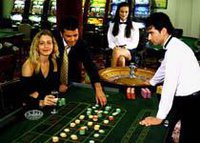Playing games of chance good for human brain
 Researchers found that during any game or a competition human brain is so engrossed by the desire to win that nearly all its areas become activated. Previously it was believed that in such cases only the "incentive" dopamine-distributing system was active. It turned out that nearly all areas of the brain respond to success or defeat, as if our lives depend on it.
The scheme of encouragement and punishment is controlled by the brain's basal ganglia - a set of subcortical neural nodes located in the central white matter of the cerebral hemispheres. The functions of these neuronal clusters vary; in particular, they are responsible for the regulation of the production of neurotransmitter dopamine. It makes us experience anxiety and dissatisfaction with the failures and feel happy in case of success or praise.
Researchers found that during any game or a competition human brain is so engrossed by the desire to win that nearly all its areas become activated. Previously it was believed that in such cases only the "incentive" dopamine-distributing system was active. It turned out that nearly all areas of the brain respond to success or defeat, as if our lives depend on it.
The scheme of encouragement and punishment is controlled by the brain's basal ganglia - a set of subcortical neural nodes located in the central white matter of the cerebral hemispheres. The functions of these neuronal clusters vary; in particular, they are responsible for the regulation of the production of neurotransmitter dopamine. It makes us experience anxiety and dissatisfaction with the failures and feel happy in case of success or praise.

Researchers from Yale University wondered whether other brain systems were involved in the situations upon which our success or failure is dependent. Indeed, in such an environment, people react very emotionally. It was easy to check with the modern technology. The experimenters used a favorite tool of neurophysiologists, MRIs.
The researchers asked volunteers to play simple games with fast results, such as "rock-paper-scissors", while observing their brain activity using the imager. With the help of the computer analysis, the researchers have made exemplary algorithm response to successful or unsuccessful outcome of the game. The result was astounding: winning or losing activated nearly all brain areas. Our brain reacts to winning or losing a game, as if it affects our entire life.
It is logical to assume that the game in this case is a very accurate model for other, more serious competitive situations. Throughout the evolution people competed with each other for the resources, prestige and the opposite sex. This means that winning guaranteed success in all important areas of life - production of food, finding a decent social status, and procreation. Not surprisingly, the brain rapidly responds to such situations.
Another interesting fact is the difference in the intensity of the brain activity in situations of winning and losing in different people, and how it affects the "competitive spirit". There are gamblers and those who do not care that much. There are extremes: those who completely avoid the competition, and, conversely, ultra-competitive people, gamers and those who cannot tolerate anyone's superiority.
It has been already established that the brain of gamblers responds to wins with greater intensity. The amount of dopamine delivered to their brains when they are winning is much greater than in healthy people without addiction to roulette and cards. Reduction of tryptophan - the substance responsible for the feeling of joy and pleasure - by contrast, encourages players to leave the table, especially if they are losing money.
Interestingly, the blockade of dopamine receptors has no effect on the behavior of players. Perhaps, under the influence of dopamine that has already been delivered to the brain, venturesome people experience a shift in their value systems, after which blocking the "high" is meaningless: the decision to continue the game has already been made.
Scientists have established that the activity of dopamine receptors affects the estimate of the magnitude and significance of the loss. Under the influence of this neurotransmitter gamers think it would be easy to recoup. The illusions that fuel people with gambling addiction indeed suggest major changes in the brain. Experts tell us with amazement that many gamblers consider themselves businesspeople. They see time spent at slot machines as their own small business that generates income.
They call money spent on gambling "business investment", the wins - "income", and loss - "expenses." Moreover, when these "businesspeople" go bankrupt with a great deal of outstanding credit, they see only one way to pay off debts - to win. Healthy people see a gross error in this logic, but gamers are completely devoid of criticality when it comes to gambling. No one knows whether neuroscientists will be able to find a means for reducing dependence on the game. So far individuals with gambling addiction are frequent clients of psychotherapists and the nature of their addiction is considered close to drug addiction.
Yana Filimonova
Pravda.Ru
Subscribe to Pravda.Ru Telegram channel, Facebook, RSS!


